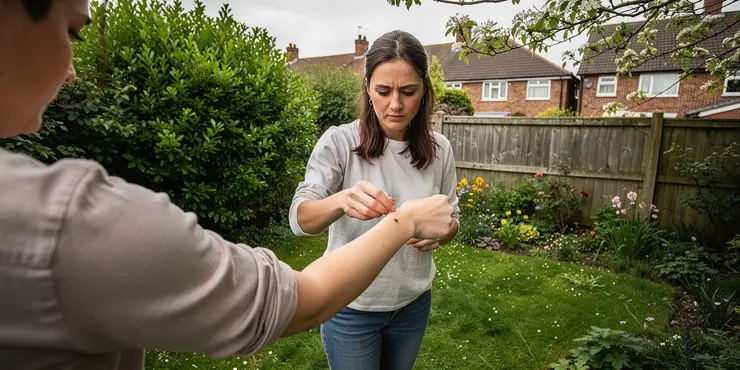
Find Help
More Items From Ergsy search
-
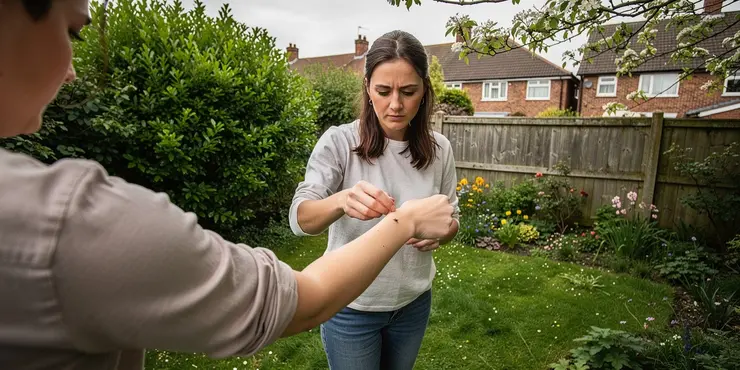
What should you do if you find a tick on your body?
Relevance: 100%
-
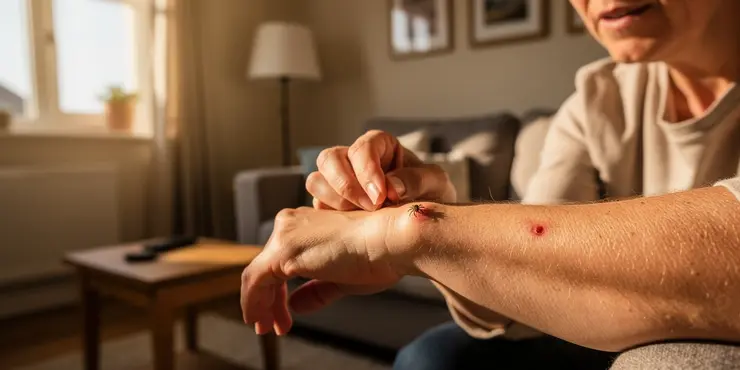
Tick Bites: Should you be worried?
Relevance: 79%
-
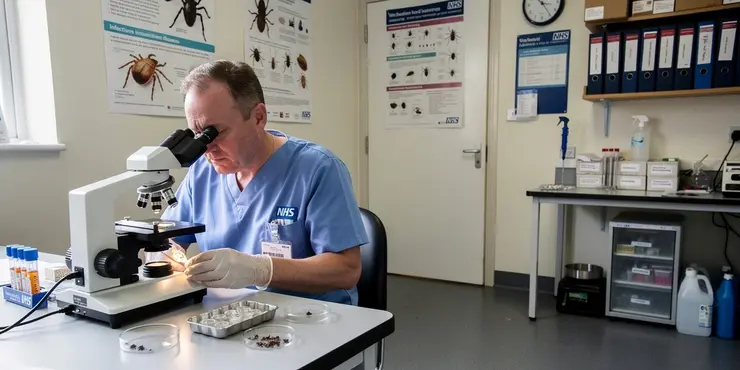
What kind of ticks carry Lyme disease?
Relevance: 78%
-
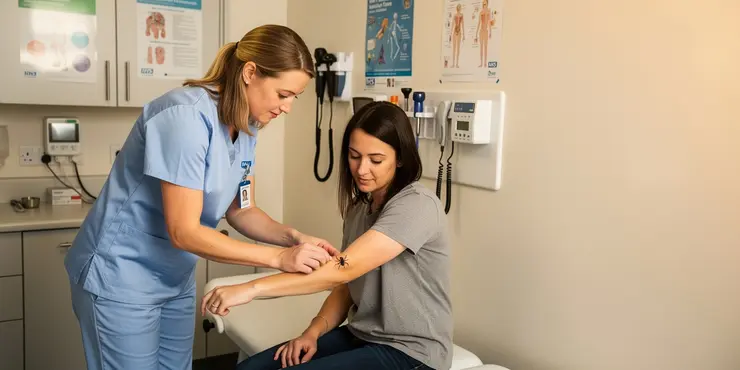
How long does a tick need to be attached to transmit Lyme disease?
Relevance: 50%
-

How do you prevent Lyme disease?
Relevance: 43%
-

Are AI body scans reliable?
Relevance: 43%
-
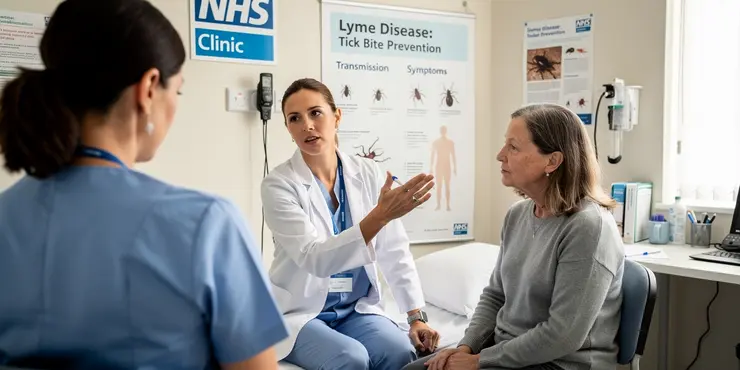
How is Lyme disease transmitted?
Relevance: 42%
-
Is salt necessary for the body?
Relevance: 41%
-

What is Lyme Disease?
Relevance: 40%
-

Can pets get Lyme disease?
Relevance: 39%
-

Are there regulations on transporting the body before the funeral?
Relevance: 38%
-

Lyme disease: What is it?
Relevance: 37%
-

What is the first sign of Lyme disease?
Relevance: 37%
-
How does the body process salt?
Relevance: 37%
-

Is Lyme disease contagious between humans?
Relevance: 36%
-

Where is GLP-1 produced in the body?
Relevance: 36%
-

What are common symptoms of Lyme disease?
Relevance: 35%
-
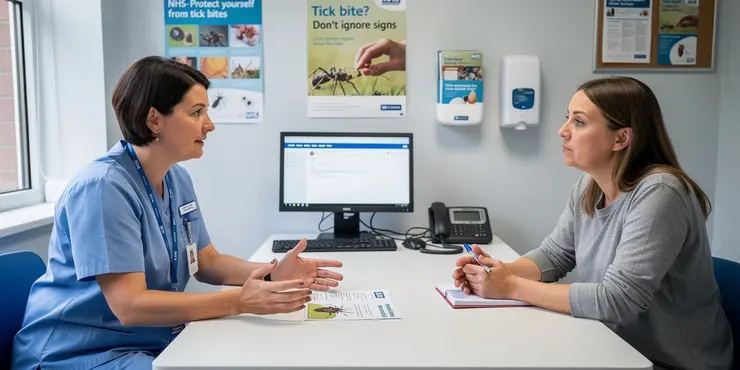
Can you get Lyme disease more than once?
Relevance: 35%
-

Should I use a different SPF for my face and body?
Relevance: 35%
-
Does the body store all the fat I consume?
Relevance: 35%
-
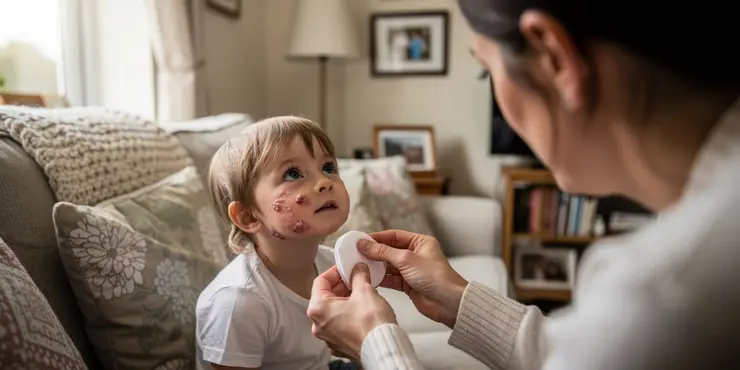
Can impetigo spread to other parts of my body?
Relevance: 35%
-
What is body dysmorphia and how is it related to eating disorders?
Relevance: 34%
-

How is cortisol regulated in the body?
Relevance: 34%
-

Where is Lyme disease most commonly found?
Relevance: 33%
-

What role do regulatory bodies play in fee transparency?
Relevance: 33%
-

How does cortisol affect the body's stress response?
Relevance: 32%
-

Can bowel cancer spread to other parts of the body?
Relevance: 31%
-

How does motor neurone disease affect the body?
Relevance: 31%
-

Can testicular cancer spread to other parts of the body?
Relevance: 31%
-

What effects do spiking drugs have on the body?
Relevance: 31%
-

What is the prostate gland's role in the body?
Relevance: 30%
-

What role does cortisol play in the body?
Relevance: 30%
-
Does tanning on sunbeds help the body produce vitamin D?
Relevance: 30%
-
What happens to your body when you stop eating sugar?
Relevance: 29%
-

How effective are antibiotics in treating Lyme disease?
Relevance: 29%
-

Does E. coli play any beneficial role in the human body?
Relevance: 28%
-

Can Botox spread to other parts of the body?
Relevance: 28%
-

Which body is responsible for enforcing refunds by UK water companies?
Relevance: 27%
-

Is there a vaccine for Lyme disease?
Relevance: 26%
-

What happens if Lyme disease is left untreated?
Relevance: 26%
Introduction
Finding a tick on your body can be concerning, especially given the potential for tick-borne diseases like Lyme disease. In the UK, ticks are most active from spring to autumn, and they can be found in many places such as woods, grasslands, or even your garden. Knowing how to properly remove a tick and what steps to take afterward is crucial in minimizing any health risks. This guide provides essential information on what to do if you find a tick on your body.
Step 1: Remain Calm
First and foremost, it’s important to stay calm. While ticks can transmit diseases, not all ticks are infected, and the risk of disease transmission decreases significantly if a tick is removed promptly. Take a deep breath and prepare to remove the tick as soon as you discover it.
Step 2: Removing the Tick
Use a pair of fine-tipped tweezers to grasp the tick as close to your skin's surface as possible. Avoid using your fingers or any blunt instruments, as squeezing could push infected fluids into your skin. Pull the tick upward with steady, even pressure; do not twist or jerk suddenly, as this can cause the tick's mouth-parts to break off and remain in the skin.
If parts of the tick break off and remain in the skin, try to remove them with the tweezers. If you cannot remove the mouth-parts easily, leave them in place and let the skin heal naturally. After removing the tick, thoroughly clean the bite area and your hands with rubbing alcohol, an iodine scrub, or soap and water.
Step 3: Dispose of the Tick
Once removed, do not crush the tick between your fingers. Instead, dispose of it by placing it in a sealed bag or container, wrapping it tightly in tape, or flushing it down the toilet. You might also consider saving the tick in a sealed plastic bag in case you experience symptoms later and need it for identification.
Step 4: Monitor Your Health
Keep an eye on the site of the bite and monitor your health over the following weeks. Symptoms of tick-borne diseases can include a rash, fever, chills, fatigue, aches, and swollen lymph nodes. The classic sign of Lyme disease is a bullseye-shaped rash, which may appear 3 to 30 days after a bite.
Step 5: Seek Medical Advice
If you experience any symptoms of illness after a tick bite, contact a healthcare professional promptly. Early diagnosis and treatment are crucial for effective management of tick-borne diseases. In the UK, doctors may prescribe antibiotics if Lyme disease is suspected.
Conclusion
Ticks in the UK are a real but manageable concern. By following these steps to safely remove a tick and monitoring your health, you can significantly reduce any potential health risks. Staying informed and taking prompt action is key to protecting yourself from tick-borne diseases.
Introduction
Finding a tick on your body can be a bit scary. Ticks can spread diseases like Lyme disease. In the UK, ticks are most active from spring to autumn. You can find ticks in places like woods, grasslands, and even your garden. It's important to know how to take off a tick and what to do after. This guide will help you know what to do if you find a tick on you.
Step 1: Remain Calm
First, stay calm. Not all ticks carry diseases. If you take the tick off quickly, there's less chance of getting sick. Take a deep breath and get ready to remove the tick.
Step 2: Removing the Tick
To take off the tick, use tweezers that have fine tips. Grab the tick close to your skin. Do not use your fingers. Pull the tick up slowly and steadily. Do not twist or pull quickly. This can leave parts of the tick in your skin.
If the tick's mouth-parts get stuck, try to take them out with the tweezers. If you can't, leave them. Your skin will heal by itself. Clean the bite area and your hands well with rubbing alcohol, or soap and water.
Step 3: Dispose of the Tick
Do not crush the tick. Put it in a sealed bag, or flush it down the toilet. You can also keep it in a sealed bag if you need to show it to a doctor later.
Step 4: Monitor Your Health
Watch the bite area and how you feel for a few weeks. If you get a rash, fever, feel tired, or have aches, these could be signs of a disease. For Lyme disease, look out for a rash that looks like a bullseye. This can show up 3 to 30 days after a tick bite.
Step 5: Seek Medical Advice
If you feel sick after a tick bite, see a doctor quickly. It is important to get help early if you have a tick-borne disease. In the UK, doctors might give you antibiotics if they think you have Lyme disease.
Conclusion
Ticks are found in the UK, but you can handle them safely. By following these steps, you can lower health risks from tick bites. Knowing what to do and acting fast helps keep you safe from tick-borne diseases.
Frequently Asked Questions
What is the first step if I find a tick on my body?
The first step is to remain calm and use fine-tipped tweezers to grasp the tick as close to your skin’s surface as possible.
How should I properly remove a tick?
Use steady, even pressure to pull the tick upward. Avoid twisting or jerking to prevent the mouth-parts from breaking off and remaining in the skin.
What should I do if the tick's mouth-parts remain in my skin?
If the mouth-parts break off, try to remove them with clean tweezers. If you cannot remove them easily, leave them alone and let the skin heal.
How should I clean the area after removing the tick?
After removing the tick, clean the bite area and your hands with rubbing alcohol, iodine scrub, or soap and water.
Should I keep the tick after removal?
Yes, place the tick in a sealed bag or container to show a healthcare provider if you develop symptoms later.
What should I avoid doing when removing a tick?
Avoid using home remedies such as applying heat or nail polish to the tick which can increase the risk of disease transmission.
When should I seek medical advice after a tick bite?
Seek medical advice if you experience symptoms such as rash, fever, or joint/muscle pain within a few weeks of the bite.
What are the symptoms of tick-borne illnesses?
Symptoms can include rash, fever, aches, and flu-like symptoms. Symptoms can vary depending on the disease.
Is it necessary to test the tick for diseases?
Testing the tick is not typically recommended; instead, monitor yourself for symptoms and consult a doctor if necessary.
Can a tick transmit diseases immediately upon attachment?
Most infections are transmitted after the tick has been attached for several hours, often 36 to 48 hours.
What tools are best for tick removal?
Fine-tipped tweezers are recommended for safe tick removal.
How can I prevent ticks in the future?
Wear long sleeves and pants, use insect repellents with DEET, and perform regular tick checks after spending time outdoors.
Can ticks bite more than one place?
Yes, ticks can bite in multiple places, so perform a thorough check of your entire body.
How long can a tick stay attached?
Ticks can stay attached for several days if undisturbed, which increases the risk of disease transmission.
What should I do with clothing and gear after being in tick-prone areas?
Wash clothes in hot water and tumble dry on high heat to kill ticks. Also, examine gear and pets.
Can pets bring ticks into the home?
Yes, pets can carry ticks into the home, so check pets regularly and use tick prevention products.
Is redness at a tick bite site normal?
Redness might appear initially as an allergic reaction, but monitor for expanding redness which can indicate infection.
How can I identify different tick species?
Identification guides are available online, but consulting a healthcare professional for guidance is recommended if you’re worried about Lyme disease or other tick-borne illnesses.
Are all ticks carriers of diseases?
Not all ticks carry diseases, but it’s important to monitor for symptoms as a precaution.
What are the common areas ticks attach on the human body?
Ticks often attach to moist or hairy areas such as the scalp, armpits, and groin.
What should I do first if I find a tick on me?
If you find a tick on your skin, stay calm. Here is what to do first:
- Get a pair of tweezers or a special tick remover tool.
- Place the tweezers close to your skin, around the tick's head.
- Pull the tick out gently and slowly. Do not twist or jerk.
- Wash your hands and the bite area with soap and water.
- Tell an adult you trust if you need help or feel worried.
If you have trouble reading or understanding, ask someone to read it to you. You can also use a reading app that reads the words out loud.
First, stay calm. Get some tweezers with tiny tips. Try to grab the tick close to your skin.
How do I take off a tick the right way?
Pull the tick up using a steady and gentle movement. Don't twist or pull quickly so the tick's head doesn't break off and stay in the skin.
What if the tick's head gets stuck in my skin?
If the tick's head is stuck:
- Don't worry too much. It's okay.
- Wash the area with soap and water.
- Put some antiseptic cream on it.
- You can use tweezers to try and gently remove the tick's head.
- If you need help, ask an adult to help you.
- If the skin gets red or hurts a lot, you might need to see a doctor.
If the mouth-parts break off, use clean tweezers to take them out. If you can’t take them out easily, leave them there. Let your skin heal on its own.
How do I clean the skin after taking off a tick?
After you take off the tick, clean where it bit you and clean your hands. You can use rubbing alcohol, iodine scrub, or soap and water to do this.
Should I keep the tick after taking it off?
Yes, put the tick in a closed bag or box. Show it to a doctor if you feel sick later.
What should I not do when taking off a tick?
Do not use home tricks like putting heat or nail polish on the tick. This can make you more likely to get sick.
When should I talk to a doctor after a tick bite?
Go to a doctor if you get any of these signs a few weeks after a bite: a rash, a fever, or pain in your muscles or joints.
What happens if a tick makes you sick?
If a tick makes you sick, you might feel:
- Very tired
- A bad headache
- Sore muscles and joints
- A fever (feel very hot)
- A rash on your skin
If you feel any of these, tell an adult or a doctor. They can help you feel better.
You might get a rash, feel hot (like a fever), have aches, or feel like you have the flu. What you feel can be different for each sickness.
Do we need to check the tick for sickness?
It is not usually a good idea to test the tick. Instead, watch your body for any signs of getting sick. If you feel unwell, talk to a doctor.
Can a tick make you sick as soon as it bites?
Most illnesses are passed on after a tick has been stuck to you for a long time, usually 36 to 48 hours.
What can I use to take off a tick?
Use small tweezers to safely take ticks off.
How can I stop ticks from coming again?
When you go outside, wear clothes with long sleeves and long pants. Use bug spray with DEET to keep insects away. After being outside, check your body for ticks. Ticks are little bugs that can be on your skin.
Can ticks bite you in more than one spot?
Yes, ticks can bite you in many places. Check your whole body carefully to find them.
How long can a tick stay on you?
Ticks can stick to you for a few days if they are not taken off. This can make it more likely for you to get sick.
What should I do with clothes and gear after being in areas with ticks?
Wash clothes in hot water. Then, dry them on high heat to kill ticks. Don't forget to check your gear and pets too.
Can pets bring ticks into the home?
Do pets like dogs and cats bring ticks inside the house?
What are ticks?
Ticks are tiny bugs that stick to animals and people. They can carry diseases.
How do ticks get inside?
Pets that play outside can pick up ticks. When pets come inside, ticks can fall off them in your house.
What can you do?
- Check your pet for ticks after they play outside.
- Use a tick comb or brush to find ticks on your pet.
- Talk to your vet about tick protection for your pet.
- Keep your yard clean and tidy to avoid ticks.
Helpful Tools:
- Tick combs to help find and remove ticks from pets.
- Online videos that show how to check pets for ticks.
Yes, pets can bring ticks into your home. Check your pets often and use tick prevention products to keep them safe.
Is it normal for a tick bite to be red?
Might turn red if allergic. Watch for redness that gets bigger. It can mean infection.
How do I know what kind of tick I see?
Look at the tick's size, color, and shape. These clues tell you what kind it is.
Use a magnifying glass: This tool makes the tick look bigger, so you can see it better.
Draw a picture: Sketch the tick on paper. It helps you remember what it looks like.
Look at a tick book or website: These have pictures and facts about different ticks. They show you what to look for.
You can find guides to help you identify ticks online. But, if you are worried about Lyme disease or other illnesses caused by ticks, it's best to talk to a doctor. They can give you good advice.
Do all ticks have diseases?
Not all ticks make you sick, but it’s good to watch for signs just to be safe.
Where do ticks usually stick on the human body?
Ticks are tiny bugs. They like to stick to places on your body where it's warm or hidden. Here are some spots to check:
- Behind your ears
- In your hair
- Under your arms
- Around your waist
- Behind your knees
- Between your legs
Use a mirror to check these areas. You can also ask someone to help you look.
Ticks like to stick to places that are warm and wet. They often go to places like your head, underarms, and private parts.
Useful Links
This website offers general information and is not a substitute for professional advice.
Always seek guidance from qualified professionals.
If you have any medical concerns or need urgent help, contact a healthcare professional or emergency services immediately.
Some of this content was generated with AI assistance. We’ve done our best to keep it accurate, helpful, and human-friendly.
- Ergsy carfully checks the information in the videos we provide here.
- Videos shown by Youtube after a video has completed, have NOT been reviewed by ERGSY.
- To view, click the arrow in centre of video.
- Most of the videos you find here will have subtitles and/or closed captions available.
- You may need to turn these on, and choose your preferred language.
- Go to the video you'd like to watch.
- If closed captions (CC) are available, settings will be visible on the bottom right of the video player.
- To turn on Captions, click settings .
- To turn off Captions, click settings again.
More Items From Ergsy search
-

What should you do if you find a tick on your body?
Relevance: 100%
-

Tick Bites: Should you be worried?
Relevance: 79%
-

What kind of ticks carry Lyme disease?
Relevance: 78%
-

How long does a tick need to be attached to transmit Lyme disease?
Relevance: 50%
-

How do you prevent Lyme disease?
Relevance: 43%
-

Are AI body scans reliable?
Relevance: 43%
-

How is Lyme disease transmitted?
Relevance: 42%
-
Is salt necessary for the body?
Relevance: 41%
-

What is Lyme Disease?
Relevance: 40%
-

Can pets get Lyme disease?
Relevance: 39%
-

Are there regulations on transporting the body before the funeral?
Relevance: 38%
-

Lyme disease: What is it?
Relevance: 37%
-

What is the first sign of Lyme disease?
Relevance: 37%
-
How does the body process salt?
Relevance: 37%
-

Is Lyme disease contagious between humans?
Relevance: 36%
-

Where is GLP-1 produced in the body?
Relevance: 36%
-

What are common symptoms of Lyme disease?
Relevance: 35%
-

Can you get Lyme disease more than once?
Relevance: 35%
-

Should I use a different SPF for my face and body?
Relevance: 35%
-
Does the body store all the fat I consume?
Relevance: 35%
-

Can impetigo spread to other parts of my body?
Relevance: 35%
-
What is body dysmorphia and how is it related to eating disorders?
Relevance: 34%
-

How is cortisol regulated in the body?
Relevance: 34%
-

Where is Lyme disease most commonly found?
Relevance: 33%
-

What role do regulatory bodies play in fee transparency?
Relevance: 33%
-

How does cortisol affect the body's stress response?
Relevance: 32%
-

Can bowel cancer spread to other parts of the body?
Relevance: 31%
-

How does motor neurone disease affect the body?
Relevance: 31%
-

Can testicular cancer spread to other parts of the body?
Relevance: 31%
-

What effects do spiking drugs have on the body?
Relevance: 31%
-

What is the prostate gland's role in the body?
Relevance: 30%
-

What role does cortisol play in the body?
Relevance: 30%
-
Does tanning on sunbeds help the body produce vitamin D?
Relevance: 30%
-
What happens to your body when you stop eating sugar?
Relevance: 29%
-

How effective are antibiotics in treating Lyme disease?
Relevance: 29%
-

Does E. coli play any beneficial role in the human body?
Relevance: 28%
-

Can Botox spread to other parts of the body?
Relevance: 28%
-

Which body is responsible for enforcing refunds by UK water companies?
Relevance: 27%
-

Is there a vaccine for Lyme disease?
Relevance: 26%
-

What happens if Lyme disease is left untreated?
Relevance: 26%


